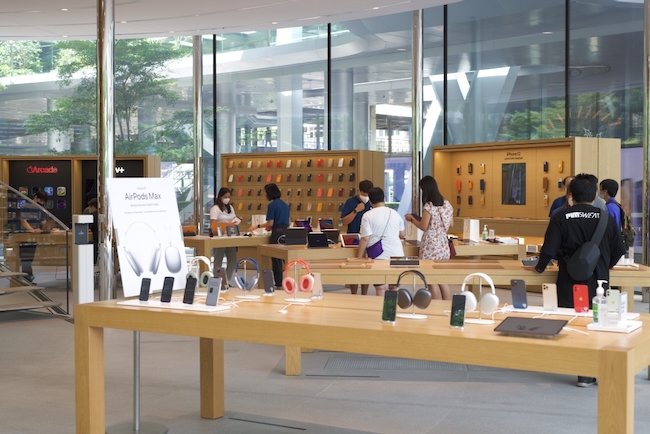|
|
Tuesday Notes: Big tech and Politicians; Control of the Rumor Mill; Fiction and Tech CollideBy Graham K. Rogers
Tim Cook who has been named as best CEO by Barrons (Dennis Sellers, AppleWorld Today) is warning quite strongly against the idea of side loading (Chris Davies, Slashgear) - the ability to load an app onto a device whatever its source, which the blinkered Commissioner thinks is a good idea. An executive at Apple recently said that if iPhone users want to side load apps, they should switch to Android (Tyler Lee, Übergizmo). That was a little blunt, but he is right. The freedom to do that is available, just not on the iPhone (or iPad). It is hard enough keeping track on the Mac these days, although I am fairly careful about my sources for downloading software; I do not want to have to be wary of everything on iOS as well. In the USA, Sen Klobuchar is about to introduce legislation (Patently Apple) that will revamp antitrust legislation and the politicians are determined to rein in the tech giants. Capitalism is OK for them, except when it is really big companies like Apple and the rest. In some cases this may be shutting the stable door after the horse has bolted, particularly when the personal fortunes of Facebook and Amazon heads are added up, although there is little attempt to bring others that have potential to do far more damage under control, like Palantir. Britain, Italy, Germany (William Gallagher, AppleInsider) and now France, separately from the EU, are now looking to examine the structures of these companies, while Russia is insisting that tech giants open local offices (Tim Hardwick, MacRumors). It seems to be open season on Big Tech. On taxation others, particularly Britain, make a lot of noise, but turn a blind eye to offshore tax havens. This was said to be one of the reasons for Brexit, as the EU was introducing controls (from last January) on those who salted their wealth far away from the grasp of the taxman. Remember, the politicians write the laws, so should not be upset when companies take advantage of what those laws allow.
Now, Wesley Hilliard (AppleInsider) reports that Apple has taken the bull by the horns and sent letters to two of the most prolific leakers in China: Kang and Duan Rui. As the leaks affect share prices (perhaps the main reason they do it) and customer ordering - why order this Mac now if the rumor says a replacement is coming next month?. Apple has sent cease and desist letters to the Chinese leakers, but there are one or two more that I would prefer not to be in my timeline in the future. Speculation used to be fun, but these have taken all the enjoyment out of it. I saw that Mark Gurman now has his own newsletter which will free him a little from his Bloomberg overlords. It promises to include news and rumors amongst other things. He seems to have started with the idea that Apple will be developing even larger versions of the iPad Pro in the future. Within hours several other sites repeated this as if it were fact. I am quite happy with the versions that exist now, and have memories of running a test 17" MacBook Pro about 10 years ago. It was awkward in the backpack and I preferred the 15", it have been able to make do with 13" models for the last few years. I am pleased to see that others, like David Price (MacWorld) do not see the larger iPad Pro as a particularly good idea. Gurman who speculated that there would be new Macs at WWDC also now suggests that there will be no Macs or other releases before the next iPhone appears in September.
 Apple Store, Central World, Bangkok
 The Shape of Things to Come
The AppleTV+ series, Ted Lasso which was a surprise hit both sides of the Atlantic, is about to start its second season (23 July). Warner Bros now have an official AFC Richmond gear shop which has several shirts, hoodies, cups and other merchandise. The series has garnered a couple or awards and recently, Evan Selleck (iDownload Blog) reports, the series has earned a Peabody award for excellence in storytelling. Selleck adds that "Sudeikis [Ted Lasso] himself earned a win from the Screen Actors Guild earlier this year. And the show picked up three wins from this year's Critics Choice Awards, too." I also see that Asimov's Foundation series is to start on AppleTV+ in late September (24th). I read last week that the German military had a program that worked with a university to try to come up with some form of predictability. There is a trickle-down effect. When someone comes up with a revolutionary concept, say Einstein and the Theory of Relativity, perhaps only a few scientists understand the ideas and implications. Within a few years, intellectuals, including writers will have grasped at least the basics, and then these ideas perhaps appear in novels or other sources. Eventually, the wider public will have at least some knowledge: there are few now, for example, who are not aware of E=MC2. While there were some successes in predicting political changes, Project Cassandra (I like that) was eventually cancelled (Philip Olterman, Guardian). The US Navy is not averse to trying new technology and it was revealed that they have been borrowing some of the images that users have submitted to an app that is available in many countries, including Thailand. Photography of ordinary objects and scenes, submitted by the users of the app for cash and presumably sold on to the Navy, are of low worth on their own, but a cache of hundreds or thousands of images can help quickly build a picture of a society without the need for spies on the ground (Michael Zhang, Petapixel). I had always wondered about the Russian photo app Prisma which would send data back to its servers in Russia for manipulation. It would be an easy to step to copy the images for a database and collect other data such as GPS information. As much as I liked the output from Prisma, I removed this from my devices. Waterlogue is much nicer.

One of the reasons I avoided Windows in the 1990s, apart from moving to the Mac then, was the controls that appeared. This worsened when the internet was widely available as the OS would phone home to check that the installation was licensed. All very well, but this did not help many users in developing countries whose micro economies were built on free copies of the OS and other software. They had to comply somehow. Microsoft tried hard when DOS 5.0 was released and admitting that they knew most users in Thailand used pirated versions, offered an upgrade to 5.0 for 500 baht, with all our sins forgotten. As it had been impossible to buy legitimate software (I tried and was rejected on a number of occasions), I jumped at this. I still have the 5.25" disks in my office, as well as the 3.5" disks for DOS 6. In the Ballmer days, a number of restrictions and limitations were brought in and licensing became rather complex. There seemed to be several different levels of OS, depending of course on what users, or companies, were asked to pay. I did not use Windows at all (ever) so paid little attention to the details. With Apple, there was one OS X (now macOS) with an extra server option for those who wanted those functions. Even with the vanilla version it is possible to set up some server features, like a website with Apache Server which is now absorbed into macOS. Although some did register their Windows installations and were online, sometimes that recognition process failed and users were left (at least for a time) with an expensive brick. That seems be the case with Windows 11 as there are some hardware specifics required, or the OS will not run. That apparently includes Macs as well, but who would want to (use Parallels)? These restrictions appear to mean that some PCs that are only a couple of years old cannot run the new OS. My 2014 Mac mini will be able to run Monterey, although some features will not be available: a gentle transition. Joel Hruska (ExtremeTech) has the details but his title may be enough: Windows 11 May Not Run on Early Ryzen, Threadripper, Skylake-X, or Any Pre-2016 Intel PCs. Hruska is also pretty unhappy about the way users are supposed to log in with the new OS, using a Microsoft Account. That is like Apple insisting we all log in using the iCloud account. Some services are better if we are connected, but if the internet is off, or the iCloud account is not being used, the Mac will still run. I have set up a couple of Macs without iCloud. There would be a major outcry if that need was enforced. Nonetheless, this anger is reflected with a number of online comments I saw.

Graham K. Rogers teaches at the Faculty of Engineering, Mahidol University in Thailand. He wrote in the Bangkok Post, Database supplement on IT subjects. For the last seven years of Database he wrote a column on Apple and Macs. After 3 years writing a column in the Life supplement, he is now no longer associated with the Bangkok Post. He can be followed on Twitter (@extensions_th) |
|


